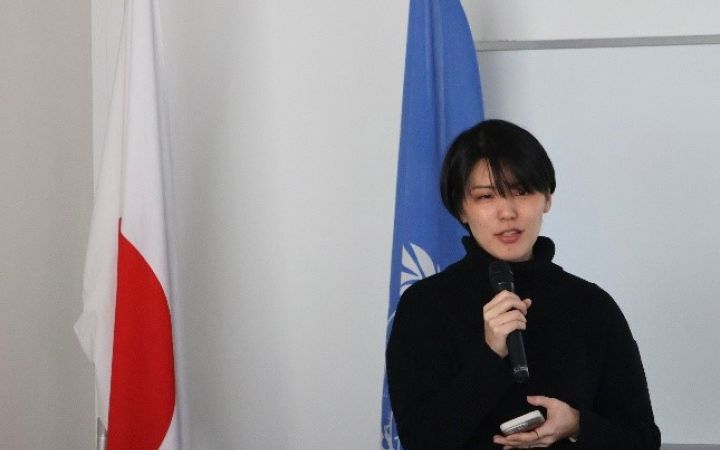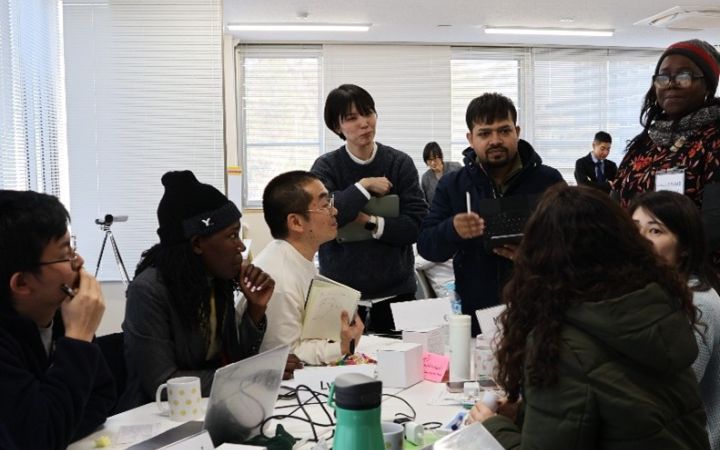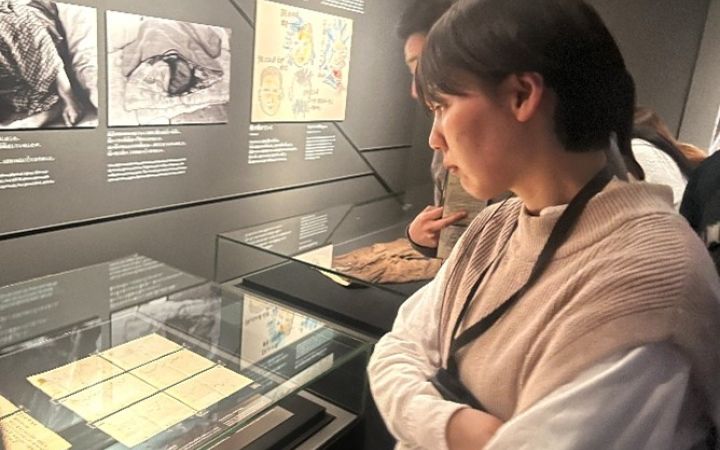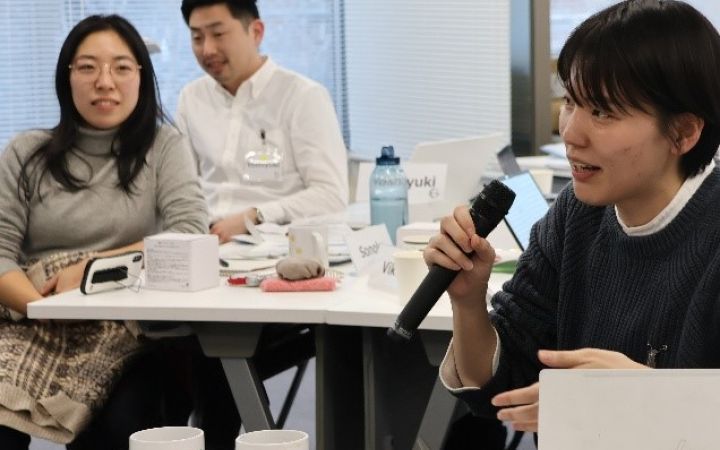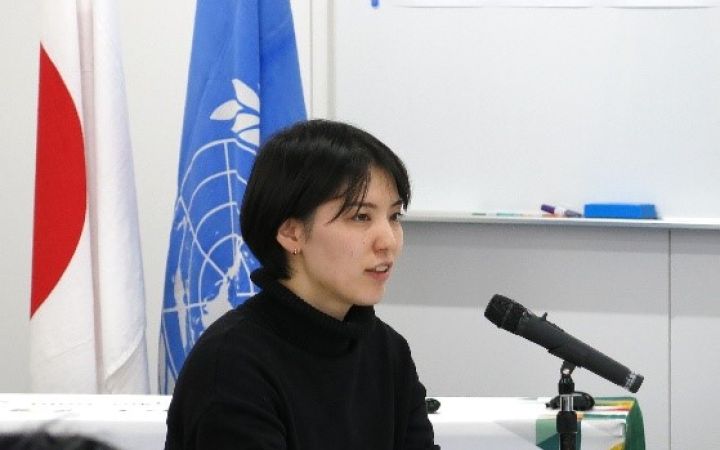- Mariya Asagi is a development professional from Japan who specializes in educational and humanitarian support.
- She participated in the Primary Course, part of The Programme for Global Human Resource Development for Peacebuilding and Development of the Ministry of Foreign Affairs of Japan, held online and in Hiroshima and Tokyo, Japan, in January and February 2025. Hiroshima University is commissioned to implement the Programme, in collaboration with the United Nations Volunteer (UNV) programme and United Nations Institute for Training and Research (UNITAR).
- In the course, Mariya gained insights into crisis management and the UN system. She is applying her new knowledge during her current UN Volunteer assignment in Jordan, focusing on sustainable solutions for peace in conflict areas.
1 July 2025, Hiroshima, Japan - For seven years, Mariya Asagi from Japan worked in educational and humanitarian NGOs in Afghanistan, Laos, and Myanmar. Motivated by her goal of joining the United Nations, she participated in the Primary Course of The Programme for Global Human Resource Development for Peacebuilding and Development in early 2025, sponsored by the Ministry of Foreign Affairs of Japan and held online and in Hiroshima and Tokyo, Japan, in January and February 2025.
Hiroshima University is implementing this Programme, in collaboration with the United Nations Volunteer (UNV) programme and United Nations Institute for Training and Research (UNITAR).
Learning the Complexities of Conflict Resolution and Reconstruction
While in Afghanistan and Myanmar, Mariya felt the limitations of working without a thorough understanding of the deconstruction phase of conflict, which encompasses social reintegration, physical reconstruction, and institution-building.
As an aid worker, it’s quite necessary to understand the deconstruction phase. Not only temporary assistance but also sustainable and durable solutions should be provided. So this is … my motivation and what I want to tackle.
—Mariya Asagi, The Programme for Global Human Resource Development for Peacebuilding and Development, the Primary Course alum, Japan
After completing the course, however, Mariya feels better equipped to work in emergency and development responses. The interactive sessions and group work gave her valuable insights into crisis management. The course also reaffirmed her conviction that communication skills, such as active listening and consolidating varying opinions, are fundamental for those who work in peacebuilding.
Mariya also came to a profound realization during a visit to the Hiroshima Peace Memorial Museum – an experience that left her at a loss for words. She realized that people can define peace in different ways: some people fight for peace, while others fight for justice. She understood that defining peace is not only personal but also delicate. Mariya realized that peace isn't something that can be imposed from the outside. An individual understanding of peace is important to spreading the idea of peace by sharing it with others.
Gaining a Supportive Professional Network
Apart from the knowledge and skills, the most precious thing Mariya says she took from the course was the connections she formed with fellow participants.
What I expected from this course was to gain a lot of ideas, knowledge and skills. But when I look back at what I learned... Actually, my learning came from peers, so I really encourage many people to join this course, not only to gain the skill and knowledge, but also to develop a network… It helped me to pursue my career with the peer engagement and the mentorship...
—Mariya Asagi, The Primary Course alum, Japan
She expects that this new network of colleagues will continue to share information and resources and support each other throughout their careers.
Ready for the UN
Having completed the 4-week training, Mariya set off on a one-year UN Volunteer assignment at the Office of the United Nations High Commissioner for Refugees (UNHCR) Jordan as an Associate Programme Officer. There, she hopes to apply the knowledge she gained from the Primary Course, particularly on the workings and mandates of the UN system.
Mariya is determined to adopt a flexible approach during her UNV assignment, reminding herself that the peace process is not linear and needs to be adjusted according to what is happening on the ground.
Thanks to the course, Mariya feels better prepared for a career as a development professional. She hopes to propose sustainable solutions during the transition from the emergency crisis phase to the peacebuilding phase. She aspires to contribute to creating a fairer world where individuals can live with dignity and peace of mind.
Although I'm still navigating many uncertainties, I feel genuinely motivated by the opportunity to contribute in some way through my work on the ground. Witnessing the instability surrounding refugee situations and how it affects aid delivery can be challenging at times, inspiring me to keep making a meaningful difference. I aim to continually improve by embracing each opportunity to contribute.”
—Mariya Asagi, The Primary Course alum, Japan
The original version of this article was published on the website of the Global Peace and Development Career Network (GPAD) Office of Hiroshima University.
About The Human Resource Development Programme by the Ministry of Foreign Affairs of Japan
The Ministry of Foreign Affairs of Japan has implemented its human resource development programme in peacebuilding since 2007. In the fiscal year 2015, “The Programme for Global Human Resource Development for Peacebuilding and Development” was launched to comprehensively identify, develop, and support individuals to build their careers in these fields. From fiscal year 2024, Hiroshima University was commissioned by the Ministry of Foreign Affairs to implement this Programme, in collaboration with UNITAR and UNV.
About Hiroshima University
Hiroshima University was founded in 1949 in Hiroshima City, the first city to experience an atomic bomb. Guided by its Charter, Hiroshima University is committed to respecting the human rights and individuality of each person and to fostering human resources that will contribute to the realization of a free, peaceful, and sustainable society. It also aims to be a university that is open to and trusted by society, thereby contributing to the local and international community. Furthermore, Hiroshima University aims to lead the world in providing cutting-edge solutions to global issues. In this way, we aim to nurture internationally-minded individuals who are committed to addressing the challenges and pursuing peace.
About UNV
The United Nations Volunteer (UNV) programme contributes to peace and development through volunteerism worldwide. The organization works with partners to deploy qualified, highly motivated, and well-supported UN Volunteers to UN entities. UNV administers the Overseas Assignment component of the Primary Course. Under this Programme, more than 200 Programme Associates have been dispatched as UN Volunteers. They have served in more than 50 countries and territories, including Côte d’Ivoire, Ethiopia, Guinea-Bissau, Kenya, Liberia, Rwanda, Sierra Leone, South Sudan, and Tanzania. Some of the main UN entities that host UN Volunteers under this programme include UNDP, UNHCR, UNICEF, IOM, and WFP.
About UNITAR
The United Nations Institute for Training and Research (UNITAR) is a dedicated training arm of the United Nations. In 2024, UNITAR trained over 550,000 learners around the world to support their actions for a better future. UNITAR has a global presence, with offices in Geneva, Hiroshima, New York and Bonn and networks around the world. Find out more at www.unitar.org


